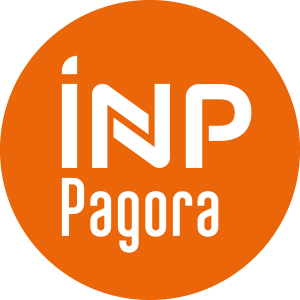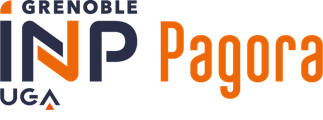Number of hours
- Lectures -
- Projects -
- Tutorials -
- Internship -
- Laboratory works 4.0
- Written tests -
ECTS
ECTS 7.0
Goal(s)
Learning outcomes :
- To evaluate printed matter produced by different printing processes and on different media: visual observation, wire counting, comparison, control bar measurements.
- To use a densitometer and interpret its measurements.
- To understand the limitations of densitometric measurements.
- To understand the necessary match between substrate, printing processes, consumables and settings.
Aurore DENNEULIN
Content(s)
This practical work enables students to observe and compare documents obtained using different printing processes, in order to show the interdependency between processes and substrates.
The densitometry principles and the use of a densitometer are explained:
- definition of the optical density and calibration of the densitometer;
- measurement of the solid ink density, of the tone value increase, of the contrast index and of the trapping index;
- plotting tone reproduction curves.
Interpreting the results is important.
"Processes for printing industry" course (3FMT2031)
https://refens.grenoble-inp.fr/Pagora/2021/modifie?id=620210000000002&type=models.Matiere
Accessibility for people with disabilities : please contact us for further information
Written or typed report. Interpretation of the results is expected.
Note = note du compte rendu.
The grade is that of the report.
NON RATTRAPABLE
The course exists in the following branches:
- Curriculum - Pagora Engineer - Student - Semester 5
- Curriculum - Pagora Engineer - Apprentice - Semester 5
Course ID : 3FMT3043
Course language(s): 
You can find this course among all other courses.
Environmental security
Si le TP conduit les étudiants autour d'une presse :
- respect des consignes de sécurité détaillées par l'enseignant avant les travaux;
- cheveux longs attachés autour des machines, pas de foulard, pas d'habits flottants.
Les éventuels effluents sont collectés pour être évacués par des prestataires spécialisés / interdiction d'évacuer les effluents dans les réseaux communs.
If the work leads students close to a press :
- respect the safety rules described by the teacher;
- no "floating" clothes, attach long hair, etc.
If effluents are generated, they are to be collected by specialized companies and should not be thrown into the sink or sewage.
The Printing Ink Manual par R. Leach et al.
Handbook of Print Media par Helmut Kipphan.
Données économiques de l’UNIC. Economic data from the French professional printing association (UNIC).
Magazine Caractère.



